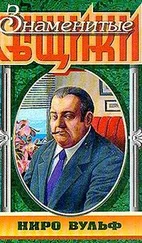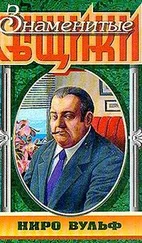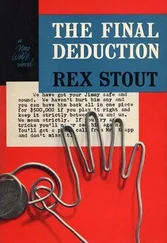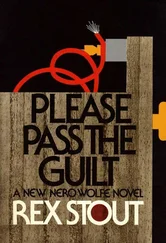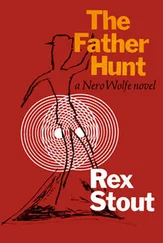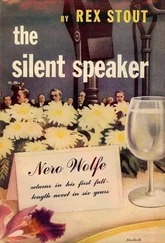“Yes, sir,” I said brightly.
“Who brought that package?”
I told him Fleet Messenger Service.
When the breeze through the hall had cleared the air I returned to the kitchen and Fritz joined me. We gave the package a look and found it was quite simple: a metal cylinder with a valve, with a brass rod that had been adjusted so that when the package was opened so was the valve. There was still a strong smell, close up, and Fritz took it to the basement. I went to the office and found Wolfe behind his desk, busy at the phone.
I dropped into my chair and dabbed at my runny eyes with my handkerchief. When he hung up I asked, “Any luck?”
“I didn’t expect any,” he growled.
“Right. Shall I call a cop?”
“No.”
I nodded. “The question was rhetorical.” I dabbed at my eyes some more, and blew my nose. “Nero Wolfe does not call cops. Nero Wolfe opens his own packages of sausage and makes his own enemies bite the dust.” I blew my nose again. “Nero Wolfe is a man who will go far if he opens one package too many. Nero Wolfe has never—”
“The question was not rhetorical,” Wolfe said rudely. “That is not what rhetorical means.”
“No? I asked it. I meant it to be rhetorical. Can you prove that I don’t know what rhetorical means?” I blew my nose. “When you ask me a question, which God knows is often, do I assume—”
The phone rang. One of the million things I do to earn my salary is to answer it, so I did. And then a funny thing happened. There is absolutely no question that it was a shock to me to hear that voice, I know that, because I felt it in my stomach. But partly what makes a shock a shock is that it is unexpected, and I do not think the sound of that voice in my ear was unexpected. I think that Wolfe and I had been sitting there talking just to hear ourselves because we both expected, after what had happened, to hear that voice sooner or later — and probably sooner.
What it said was only, “May I speak to Mr. Wolfe, please?”
I felt it in my stomach, sharp and strong, but damned if I was going to let him know it. I said, but not cordially, “Oh, hello there, if I get you. Was your name Duncan once?”
“Yes. Mr. Wolfe, please.”
“Hold the wire.” I covered the transmitter and told Wolfe, “Whosis.”
“Who?” he demanded.
“You know who from my face. Mr. X. Mr. Z. Him.”
With his lips pressed tight, Wolfe reached for his phone. “This is Nero Wolfe.”
“How do you do, Mr. Wolfe.” I was staying on, and the hard, cold, precise voice sounded exactly as it had the four previous times I had heard it, over a period of three years. It pronounced all its syllables clearly and smoothly. “Do you know who I am?”
“Yes.” Wolfe was curt. “What do you want?”
“I want to call your attention to my forbearance. That little package could have been something really destructive, but I preferred only to give you notice. As I told you about a year ago, it’s a more interesting world with you in it.”
“I find it so,” Wolfe said dryly.
“No doubt. Besides, I haven’t forgotten your brilliant exposure of the murderer of Louis Rony. It happened then that your interest ran with mine. But it doesn’t now, with Mrs. Barry Rackham, and that won’t do. Because of my regard for you, I don’t want you to lose a fee. Return her money and withdraw, and two months from today I shall send you ten thousand dollars in cash. Twice previously you have disregarded similar requests from me, and circumstances saved you. I advise strongly against a repetition. You will have to understand—”
Wolfe took the phone from his ear and placed it on the cradle. Since the effect of that would be lost if my line stayed open, I did likewise, practically simultaneously.
“By God, we’re off again,” I began. “Of all the rotten—”
“Shut up,” Wolfe growled.
I obeyed. He rested his elbows on his chair arms, interlaced his fingers in front of where he was roundest, and gazed at a corner of his desk blotter. I did not, as a matter of fact, have anything to say except that it was a lousy break, and that didn’t need saying. Wolfe had once ordered me to forget that I had ever heard the name Arnold Zeck, but whether I called him Zeck or Whosis or X, he was still the man who, some ten months ago, had arranged for two guys with an SM and a tommy gun to open up on Wolfe’s plant rooms from a roof across the street, thereby ruining ten thousand dollars’ worth of glass and equipment and turning eight thousand valuable orchid plants into a good start on a compost heap. That had been intended just for a warning.
Now he was telling us to lay off of Barry Rackham. That probably meant that without turning a finger we had found the answer to Mrs. Rackham’s question — where was her husband getting his pocket money? He had got inside the circle of Arnold Zeck’s operations, about which Wolfe had once remarked that all of them were illegal and some of them were morally repulsive. And Zeck didn’t want any snooping around one of his men. That was almost certainly the sketch, but whether it was or not, the fact remained that we had run smack into Zeck again, which was fully as bad as having a gob of Darst sausage turn into a cylinder of tear gas.
“He likes to time things right, damn him,” I complained. “He likes to make things dramatic. He had someone within range of this house to see the package being delivered, and when I left the front door open and then went and stood on the stoop that showed that the package had been opened, and as soon as he got the word he phoned. Hell, he might even—”
I stopped because I saw that I was talking to myself. Wolfe wasn’t hearing me. He still sat gazing at the corner of the blotter. I shut my trap and sat and gazed at him. It was a good five minutes before he spoke.
“Archie,” he said, looking at me.
“Yes, sir.”
“How many cases have we handled since last July?”
“All kinds? Everything? Oh, forty.”
“I would have thought more. Very well, say forty. We crossed this man’s path inadvertently two years ago, and again last year. He and I both deal with crime, and his net is spread wide, so that may be taken as a reasonable expectation for the future: once a year, or in one out of forty cases that come to us, we will run into him. This episode will be repeated.” He aimed a thumb at the phone. “That thing will ring, and that confounded voice will presume to dictate to us. If we obey the dictate we will be maintaining this office and our means of livelihood only by his sufferance. If we defy it we shall be constantly in a state of trepidant vigilance, and one or both of us will probably get killed. Well?”
I shook my head. “It couldn’t be made plainer. I don’t care much for either one.”
“Neither do I.”
“If you got killed I’d be out of a job, and if I got killed you might as well retire.” I glanced at my wristwatch. “The hell of it is we haven’t got a week to decide. It’s twelve-twenty, and I’m expected at the Hillside Kennels at three o’clock, and I have to eat lunch and shave and change my clothes. That is, if I go. If I go?”
“Precisely,” Wolfe sighed. “That’s point two. Two years ago, in the Orchard case, I took to myself the responsibility of ignoring this man’s threat. Last year, in the Kane case, I did the same. This time I don’t want to and I won’t. Basic policy is my affair, I know that, but I am not going to tell you that in order to earn your pay you must go up there today and look at Mr. Rackham. If you prefer, you may phone and postpone it, and we’ll consider the matter at greater length.”
I had my brows raised at him. “I’ll be damned. Put it on me, huh?”
“Yes. My nerve is gone. If public servants and other respected citizens take orders from this man, why shouldn’t I?”
Читать дальше

